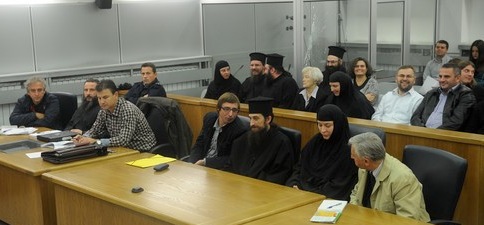The Helsinki Committee reports about the state persecution on religious basis of the political prisoner Archbishop Jovan and the Orthodox Ohrid Archbishopric


Orthodox Ohrid Archbishopric – May – June 2014
The Helsinki Committee for Human Rights in R. Macedonia, in accordance to its mission to monitor the state of the human rights and freedoms in R. Macedonia, published its Annual Report for 2013.
The observation of the Helsinki Committee is that in 2013, as in the previous several years, there had been serious violations of the freedoms and the rights of the citizens, as well as severe violations of the principle of the rule of the law and the legal state. Moreover, what is especially alarming is that the registered violations of the human rights and freedoms are indicating not only systematical problems in the functioning of the organs and the institutions, but also misuse of their authority.
In the chapter about the civil and political rights of this Annual Report, in the part that speaks of the political prisoners in R. Macedonia, the imprisonment of Archbishop Jovan of Ohrid is indicated as a first case.
The Report says that Archbishop Jovan Vraniskovski is the first political prisoner in R. Macedonia, since its independence.
In the course of 2013, Mr. Vraniskovski, along with 18 other persons (amongst whom his mother, his sister and his uncle, priests, followers and supporters of the unregistered Orthodox Ohrid Archbishopric), were accused of alleged money laundering through an assembly of citizens that intended to build an object for meetings of the faithful. The police action for arresting of the accused was named “The Schismatic”, which is equal to prejudice and which represents a direct violation of the principle of presumption of innocence of the accused. There is a verdict by the Criminal Court in Skopje, which is not effective, for imprisoning Mr. Vraniskovski to a three-year-long prison term, and all the rest of the accused to a two-year prison term, which will not be executed unless the sentenced perform a new criminal act in the next five years. The representatives of the Helsinki Committee followed all the court proceedings, but they were not convinced in the arguments provided by the Public Prosecution in order to prove the guilt for any of the accused.
On the day the pronouncing of the verdict was scheduled for, the Court Council decided to return the case in the phase of main hearing, and at the same time, without the knowledge of the accused, nor of their lawyer, announced that a person that was allegedly making a deal with Mr. Vraniskovski for purchase of land property was to witness. The witness claimed that he was making the deal on his behalf, and on the behalf of his neighbors who in written form authorized him to be their proxy. The first defendant denied that he had ever met with the witness, and after that the lawyer of the defense requested that the written authorization is presented as an evidence to the court. At that moment the Court Council left the courtroom and after a twenty-minute counseling announced that the request of the defense is rejected, and the court procedure is ended. The first instance verdict was appealed, and the Court of Appeals in Skopje needed more than seven months to set a date for a public hearing in April 2014. When the public hearing was supposed to finally take place, the court postponed it for May, because Mr. Vraniskovski was not brought to the court from the “Idrizovo” prison. In May, the prison authorities, without notifying the Court for the reasons, once again did not bring the defendant to the Court.
R. Macedonia since 2004 refuses to register the Orthodox Ohrid Archbishopric as a church or a religious group. That is a violation of Article 9 (freedom of belief), Article 11 (freedom of assembly and association) and Article 14 (prohibition of discrimination) of the European Convention on Human Rights.
The Helsinki Committee is representing the Orthodox Ohrid Archbishopric before the European Court for Human Rights since 2006 and expects the verdict in the course of 2014. Apart from the discrimination and the administrative barriers the members of this church are facing, they are being stigmatized in the public by being named “traitors, schismatics and criminals”, while Mr. Vraniskovski undergoes continuous criminal prosecution by the authorities. In the past 11 years, he has been imprisoned in six terms, and at the moment he is serving a sentence in the “Idrizovo” prison, in Skopje.
Link to the Report: http://www.mhc.org.mk/reports/213
